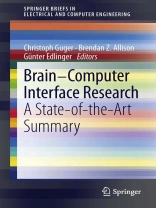Brain-computer interfaces (BCIs) are rapidly developing into a mainstream, worldwide research endeavor. With so many new groups and projects, it can be difficult to identify the best ones. This book summarizes ten leading projects from around the world. About 60 submissions were received in 2011 for the highly competitive BCI Research Award, and an international jury selected the top ten. This Brief gives a concise but carefully illustrated and fully up-to-date description of each of these projects, together with an introduction and concluding chapter by the editors.
Innehållsförteckning
Exploring the Cortical Dynamics of Learning by Leveraging BCI Paradigms.- An Auditory Output Brain-Computer Interface for Speech Communication.- User-Appropriate and Robust Control Strategies to Enhance Brain-Computer Interface Performance and Usability.- What’s Your Next Move? Detecting Movement Intention for Stroke Rehabilitation.- A Review of Performance Variations in SMR-based Brain Computer Interfaces (BCIs).-
Exploring the cortical dynamics of learning by leveraging BCI paradigms.- Seven Degrees of Freedom Cortical Control of a Robotic Arm.- Utilizing High Gamma (HG) Band Power Changes as Control Signal for Non-invasive BCI.- User-Appropriate and Robust Control Strategies to Enhance Brain Computer Interface Performance and Usability.- What are the Neuro-physiological Causes of Performance Variations in Brain-Computer Interfacing?.- Using the Electrocorticographic Speech Network to Control a Brain-Computer Interface in Humans.- Towards Communication in the Completely Locked-in State: Neuroelectric Semantic Conditioning BCI.- An Affective BCI Using Multiple ERP Components Associated to Facial Emotion Processing.












